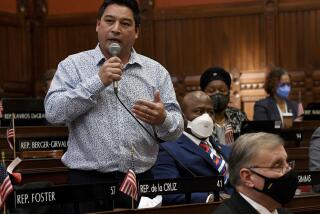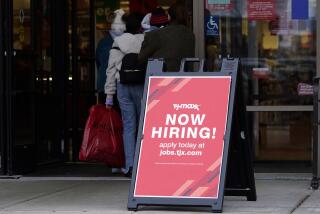GOP congressman’s lonely fight to revive jobless benefits
Not far from once-booming Atlantic City, here’s what the end of federal unemployment insurance looks like in a tattered community where the jobless rate is still almost twice the national average.
A solitary Republican congressman stands in the afternoon sun, struggling against the odds and the majority in his own party, to rally a handful of supporters seeking the resumption of unemployment benefits that were cut off late last year.
The local workforce development office, a newer building in an otherwise shabby stretch of downtown Pleasantville, swells with job seekers, many from nearby casinos that fueled a boom before the bust when gambling revenue sank.
Long-term-unemployed workers, like waitress Chris Congleton, a grandmother sidelined with a foot injury, desperately look for any available job as they come to terms with the reality that the federal aid they’d come to rely on is probably over. Three months behind on her mortgage, Congleton is hoping to go back to waiting tables, even though her doctor warned against it.
“This is a world of hurt,” said Rep. Frank A. LoBiondo, who grew up not far from here and often talks to his constituents by phone on his commute from Washington back to the southern New Jersey district. “These heart-wrenching stories that I’m hearing … you can sense just the agony that people are going through.”
But the 10-term congressman’s campaign to renew federal assistance for the long-term unemployed is a lonely one, and unlikely to produce the outcome he is hoping for in Congress.
After repeatedly extending federal benefits, Washington has little political appetite for another round — what would be the 13th since jobs started disappearing at an alarming rate in the middle of 2008.
Before expiring in December, the emergency program had lasted a record five years, an unparalleled allocation of federal aid to combat an economic slump unlike any since the Great Depression. With the abrupt end of the weekly payments, which averaged $289, more than 2 million Americans lost their aid.
Never before has Congress allowed the emergency federal benefits to lapse when long-term jobless rates are as high as they are today — about 2.4% of the workforce. Congress has, however, shut off benefits when the overall unemployment rate dropped below 7% — as it did in December.
Now, nearly five years after the recession technically ended, this unprecedented outlay of federal aid for the jobless — $260 billion over 66 months, twice as long as the next-longest run — is seeing an equally unprecedented end.
Republicans in particular have grown weary of spending federal dollars on the unemployed, arguing that the aid provides a disincentive to finding work. And as the sluggish economy shows signs of improvement, Democrats have little leverage to compel Congress to act. Each month that passes without a renewal of benefits saps the remaining political momentum.
Though the Democratic-controlled Senate passed a retroactive extension in April, only six GOP lawmakers signed a letter drafted by LoBiondo to urge Speaker John A. Boehner (R-Ohio) to bring the issue to a vote in the Republican-controlled House. No vote is scheduled.
Boehner has told President Obama he would be willing to consider another extension, but only if it was tied to specific policies to create jobs — an unlikely prospect in an election year, when compromise is difficult.
“The ball’s still in their court,” Boehner said recently.
The persistence of a historically large number of long-term jobless — those unemployed for more than six months, when most state benefits expire — has divided the parties along traditional fault lines.
Republicans have begun to argue that the end of benefits has led to more people getting back to work. The national jobless rate has dropped to 6.7%.
“Are we going to keep on paying unemployment forever?” said freshman Rep. Scott Perry (R-Pa.), whose Gettysburg-area unemployment rate is just below the national average. “If you’re against it, people want to characterize you as uncaring, which isn’t true. We’re also here to care about our constitutional duties and our fiscal duties.”
The idea that the unemployment insurance coddles workers has not been borne out in numerous studies. Nor does it sit well with Congleton, the 51-year-old waitress in neighboring Cape May County, who lost her job in the seasonal coastal community last spring. Her state aid ran out in the fall and now she and her husband could lose the home they’ve owned for 18 years.
“I didn’t get that [house] by sitting on the couch watching TV, as everyone likes to say about people who are collecting unemployment,” Congleton said. Now that benefits have dried up, Congleton said, she plans to get another waitress job when tourist season reopens, even though she knows her foot pain will return.
“I have no choice. It’s either that or lose my home,” she said.
But employment counselors warn that long-term-unemployed workers often have a hard time finding jobs because employers tend not to hire those with lengthy gaps on their resumes. Those who try to beef up their skills or switch fields learn how hard it is to compete with those with more experience. Congleton tried unsuccessfully to find secretarial work, and though she has a real estate license, she says the local home market is in a slump.
“I discovered that [nearly] 52 is not a good time to change jobs,” she said.
The coming midterm election only complicates the chances of passing an unemployment measure in the House. Many Republicans represent conservative districts where they are more concerned with beating back primary challenges from the right than with appealing to general election voters in a fall campaign against a Democrat. To their base, unemployment looks like a handout, and polls show waning public support for another extension.
“I hope to convince more colleagues that they should change their mind on this,” said LoBiondo, who is facing a tough reelection in a district won by Obama in 2012. “I’m trying to make sure it’s not the end of the line.”
More to Read
Start your day right
Sign up for Essential California for news, features and recommendations from the L.A. Times and beyond in your inbox six days a week.
You may occasionally receive promotional content from the Los Angeles Times.







